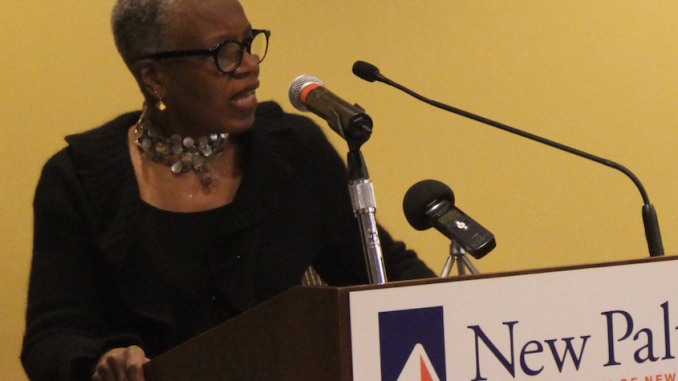
Protests, Marches on Washington, and police brutality: these are the characteristics that once defined the Civil Rights Movement in the 1950s and ‘60s and that still define our social and political climate in the U.S. today.
Five decades after the historic March on Washington and on the occasion of her class’ 50th reunion, writer, journalist and historian Janus Adams reflected on her participation in the March and her time as a theatre student at SUNY New Paltz as a Distinguished Speaker for the College.
Entitled “Know When to Leave the Plantation,” Adams told a story of the racial and gender injustice and abuse she experienced throughout her life, all while maintaining hope for future generations.
“All things are one,” Adams recalled her grandmother saying. “In this world, everything is related.”
She used those words in order to create a parallel between the country’s past and present. As a part of the March on Washington, Adams witnessed the power of social movements and of Dr. Martin Luther King Jr. himself.
However, she also encountered the chaos. From “angry white protestors” claiming that African Americans were ruining the country, to police officers hosing marchers down, Adams could not “have imagined how much and how little” has changed in the 54 years since.
While the plantations used in times of slavery are no more, Adams claimed that the plantations manifested themsleves into mass incarceration, police brutality against unarmed black men and women, islamophobia and more.
Movements and campaigns such as #BlackLivesMatter and #MeToo highlight the fact that the plantation, in a sense, is still alive and it is up to communities to collectively come together to end the institutional inequity that has caused this suffering.
“I’m angry that after 50 years, painful moments of my life and times are not irrelevant to today’s students,” she said.
As a student who faced discrimantion and abuse due to her skin color and gender, Adams recounted her memories, using them as a way to understand contemporary injustices and hardships that have their origins in past social inequality in the United States. “How do we serve, protect and defend the fundamental human rights of each and every one of us?” she asked.
In order to progress as a society in which everyone can coexist, one must “go back to go forward,” according to Adams. Learning and understanding the past helps craft one’s own justice and path of healing. After graduating in ‘67, Adams did not return to New Paltz until 40 years later, where she was delighted to see the Sojourner Truth Library, as well as the diversity of campus life.
The event, which was held Tues. at the College Terrace, marked Adams’ second time speaking on campus, since October 2017. During his introduction, College President Donald P. Christian announced that she will also be the commencement speaker for the Class of 2018.
When asked why Adams was invited to give an encore of her talk, Program Director of Special Events, Lisa Sandick simply replied “Because she was great, and I don’t think enough students were there the first time to witness her inspiring words.”
As an Emmy Award winning journalist, writer and historian, she certainly fulfills her role as a Distinguished Speaker. As the founder for BackPax, a children’s publishing company, and Harambee, the first national book club for African American literature and culture, she showcases the roles of people of color who have been erased from the nation’s history.
“I hope [the audience] was inspired,” Adams told The Oracle. “I hope they think about their own lives and those of others…and come together.”
